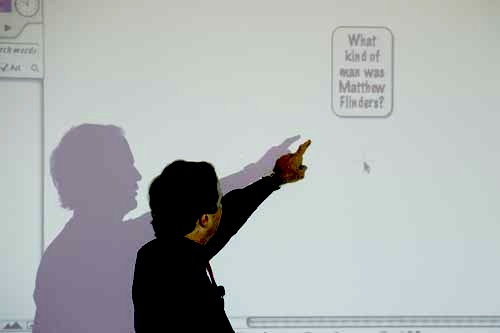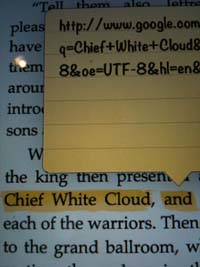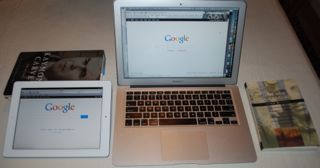
McKenzie Speeches
Lifting the Bar for the Core Standards
The Core Standards are quite demanding. In this workshop, Jamie shows the connections between these standards and a set of thinking and comprehension skills that all students must possess to handle the tasks with confidence and success. In three different versions of the workshop, he demonstrates the skills, shows how they can be developed and proposes extended professional development strategies to equip a staff with the know-how to build these kinds of learning activities into their educational daily practice.
Lost and Found — Discovery Learning
through Purposeful Wandering
Real discovery and invention require thinking off the beaten path — what Edward de Bono has called "lateral thinking" — skillful wandering in search of new ideas and possibilities. In this hands-on session, Jamie will engage members of the group working as teams with several of the wandering strategies outlined in his new book, published in September of 2011 - Lost and Found: A Guide to Discovery Learning through Purposeful Wandering. The number of strategies depends upon the length of the session and whether or not participants are working on laptops, but strategies will be drawn from the following list:
- Exploring the Dark Side

- Off the Beaten Path
- A Truly Open Mind
- Listening to Our Intuitions
- Finding the Best Words
- Sailing with the Wind
- Keeping Bad Company
- Mixing it up
- Quietude
- Stumbling
- Thinking the Unthinkable
- Surrendering
- Dancing to a New Beat
- Getting off the GoogleMap
- Seeking Affinity
- Making a Jump Shift
- Keeping Track
- Questions of Import
- Connecting the Dots
|
Gifted Thinking — Thinking Gifted
What are the prime characteristics or traits of gifted performance, and how can teachers team with parents to nurture and grow these behaviors and attitudes? What is meant by virtuosity and how can schools develop that level of prowess?
 The thesaurus lists skillfulness, mastery, expertise, prowess, proficiency, ability, aptitude; excellence, brilliance, talent, genius, artistry, flair, panache, finesse, wizardry; informal know-how, and chops as related words. The thesaurus lists skillfulness, mastery, expertise, prowess, proficiency, ability, aptitude; excellence, brilliance, talent, genius, artistry, flair, panache, finesse, wizardry; informal know-how, and chops as related words.
Synthesis and Puzzling
Meaningful inquiry involves students in wrestling with mysteries, puzzles, conundrums and difficult questions and issues that deserve thought and consideration.  We expect students to weigh the thinking of experts and elders but then come up with their own positions, decisions and suggestions. We expect students to weigh the thinking of experts and elders but then come up with their own positions, decisions and suggestions.
Research should take students beyond the mere gathering of information to the construction of new understandings. They will need a firm grounding in synthesis skills in order to combine the information in ways that may resolve puzzles and mysteries.
|
Reflecting on Reflection — Reflections, Masks, Deep Thinking and Creative Production
This workshop is designed to broaden, enrich and deepen teachers’ understanding of the central role reflection may play in helping thinkers to formulate good new ideas and insights — whether they be adults in the workplace designing a program, teachers considering learning strategies or students trying to build meaning. In a career devoted to reflection regarding the power of questions and questioning to elevate and embolden the quality of student thought, Jamie has paid special attention to the aspects of thought that involve wondering, pondering, ruminating and dreaming — all of which involve some degree of reflection. Because he and others note a cultural drift away from deep and original thought, Jamie will lift reflection into perspective within a larger context, considering the pressures upon the young in this Age of Glib to settle into habits he calls mentalsoftness — an approach to discovery that involves more scooping than synthesis and invention. In addition to exploring these issues and challenges, Jamie will lead the group through a review of educational practices that teachers might employ to quicken students’ thirst for substance, depth and fresh thinking. Among others, he will show how Edward de Bono’s Thinking Hats can help even the youngest students get their heads around and into reflection. role reflection may play in helping thinkers to formulate good new ideas and insights — whether they be adults in the workplace designing a program, teachers considering learning strategies or students trying to build meaning. In a career devoted to reflection regarding the power of questions and questioning to elevate and embolden the quality of student thought, Jamie has paid special attention to the aspects of thought that involve wondering, pondering, ruminating and dreaming — all of which involve some degree of reflection. Because he and others note a cultural drift away from deep and original thought, Jamie will lift reflection into perspective within a larger context, considering the pressures upon the young in this Age of Glib to settle into habits he calls mentalsoftness — an approach to discovery that involves more scooping than synthesis and invention. In addition to exploring these issues and challenges, Jamie will lead the group through a review of educational practices that teachers might employ to quicken students’ thirst for substance, depth and fresh thinking. Among others, he will show how Edward de Bono’s Thinking Hats can help even the youngest students get their heads around and into reflection.
 eReading: How is reading changing thanks to eBooks and how can we improve comprehension with these tools? eReading: How is reading changing thanks to eBooks and how can we improve comprehension with these tools?
This workshop suggests ways that eBooks can change the way students engage with demanding reading material, actually carrying on a conversation with the book through the insertion of notes, comments and questions as they read along. Jamie will outline strategies to take advantage of the special features of eBooks so that the reading experience becomes deeper and more engaging. The basis for this workshop is outlined in his recent article, "eReading: How is reading changing with the advent of eBooks?"
 Is the iPad a Game Changer? Is the iPad a Game Changer?
This workshop explores the pros and cons of filling a classroom with iPads or similar devices and asks how they might best be employed to improve student thinking and production. Jamie suggests that the benefits clearly outweigh the risks but warns that classroom teachers will need substantial professional development to make the transition from laptops to devices requiring touch screen skills. The basis for this workshop is outlined in his recent article, "Is the iPad a Game Changer?"
The New Book, The New Reading and The New Reader
After a decade of hesitation, readers in the world outside of school are swarming to digital readers at an impressive pace. Most schools have been slow to embrace digital reading and ebooks for a number of reasons, but it is now time to explore the ways that eBooks can enrich a school's program and enhance the comprehension and learning of students. In this session, Jamie identifies the opportunities facing a school and suggests a plan of action to give eBooks and the new reading a central and powerful role in the learning program.
The Question is the Answer
Student performance on challenging thinking tasks is directly related to the strength of their questioning skills. In this session, Jamie shows how students may be equipped with what he calls The Prime Questions: Why? How? Which? Almost all important school tasks require skillful use of questions like those ilustrated in this workshop.
|
|

 The thesaurus lists skillfulness, mastery, expertise, prowess, proficiency, ability, aptitude; excellence, brilliance, talent, genius, artistry, flair, panache, finesse, wizardry; informal know-how, and chops as related words.
The thesaurus lists skillfulness, mastery, expertise, prowess, proficiency, ability, aptitude; excellence, brilliance, talent, genius, artistry, flair, panache, finesse, wizardry; informal know-how, and chops as related words.

 We expect students to weigh the thinking of experts and elders but then come up with their own positions, decisions and suggestions.
We expect students to weigh the thinking of experts and elders but then come up with their own positions, decisions and suggestions. role reflection may play in helping thinkers to formulate good new ideas and insights — whether they be adults in the workplace designing a program, teachers considering learning strategies or students trying to build meaning. In a career devoted to reflection regarding the power of questions and questioning to elevate and embolden the quality of student thought, Jamie has paid special attention to the aspects of thought that involve wondering, pondering, ruminating and dreaming — all of which involve some degree of reflection. Because he and others note a cultural drift away from deep and original thought, Jamie will lift reflection into perspective within a larger context, considering the pressures upon the young in this Age of Glib to settle into habits he calls mentalsoftness — an approach to discovery that involves more scooping than synthesis and invention. In addition to exploring these issues and challenges, Jamie will lead the group through a review of educational practices that teachers might employ to quicken students’ thirst for substance, depth and fresh thinking. Among others, he will show how Edward de Bono’s Thinking Hats can help even the youngest students get their heads around and into reflection.
role reflection may play in helping thinkers to formulate good new ideas and insights — whether they be adults in the workplace designing a program, teachers considering learning strategies or students trying to build meaning. In a career devoted to reflection regarding the power of questions and questioning to elevate and embolden the quality of student thought, Jamie has paid special attention to the aspects of thought that involve wondering, pondering, ruminating and dreaming — all of which involve some degree of reflection. Because he and others note a cultural drift away from deep and original thought, Jamie will lift reflection into perspective within a larger context, considering the pressures upon the young in this Age of Glib to settle into habits he calls mentalsoftness — an approach to discovery that involves more scooping than synthesis and invention. In addition to exploring these issues and challenges, Jamie will lead the group through a review of educational practices that teachers might employ to quicken students’ thirst for substance, depth and fresh thinking. Among others, he will show how Edward de Bono’s Thinking Hats can help even the youngest students get their heads around and into reflection.
